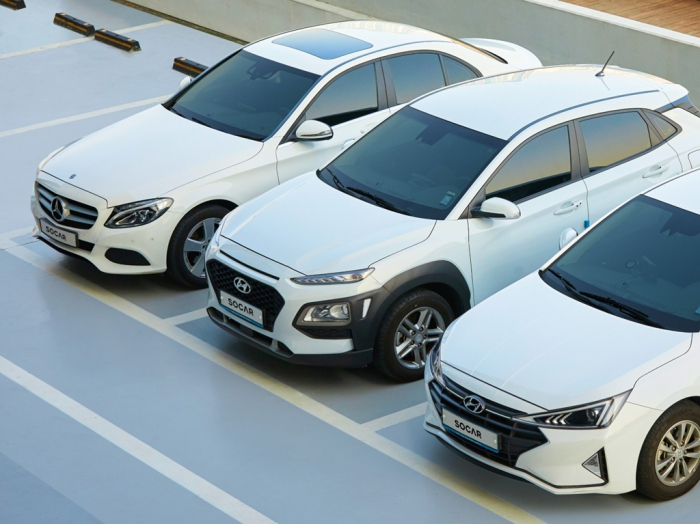
(Courtesy of Socar) South Korea’s mobility unicorn Socar Inc. ran into controversy over its valuation as the car-sharing startup set the price guidance for an initial public offering in comparison with global players that work on other businesses.Given Socar’s heavy reliance on the car-sharing sector that generates 97% of its sales, it may not be proper to estimate its value by comparison with the world’s major mobility platform operators whose businesses include the taxi, logistics, delivery, e-commerce and others, investment banking sources said.Socar is seeking to raise up to 205 billion won ($158 million) through an IPO in August at its price guidance of between 34,000 and 45,000 won apiece. Based on the range, its market capitalization was estimated at up to 1.6 trillion won.The unicorn aims to develop itself as a comprehensive mobility platform covering all transportation methods with an integrated app for various services such as electric bicycles and parking.But the ambition has yet to persuade financial market participants, who saw its valuation as excessively estimated.“It is a problem for Socar to ask (the market) to evaluate its corporate value in comparison with companies in the e-commerce and smart-car sectors, which Socar has yet to start,” said an IB source. “If it sets the IPO price at the top end of the guidance, it will list with a valuation double those of global mobility platforms such as Uber and Lyft.”Uber Technology Inc. is the world’s largest ride-sharing company based in the US, while Lyft Inc. is its competitor in North America.OVERVALUEDSocar applied enterprise value-to-sales (EV/sales) ratios to estimate its own corporate value. EV/sales ratios, which measure how much it would cost to purchase a company’s value in terms of its sales, are widely used in sectors with strong growth potential due to an industry paradigm shift.Price-to-earnings ratios are widely applied to set an IPO price, but Socar had to use an EV/sales ratio as it has been in the red. Its operating loss jumped 43% to 21 billion won in 2021 from the previous year, although its sales increased 31% to 289 billion won.Mirae Asset Securities Co., a bookrunner of the listing, estimated Socar’s valuation at 2.4 trillion won, applying eight times, an average EV/sales ratio of 10 companies worldwide whose businesses are similar to ones of Socar. The South Korean brokerage set the price guidance after discounting the estimated value by 33.9-50%. Socar’s EV/sales ratios were 3.9-5.2 times, based on the range.The 10 companies not only included Uber, Lyft and Grab Holdings Inc, Southeast Asia’s top ride-hailing company, but also PT GoTo Gojek Tokopedia Tbk, Indonesia’s No. 1 delivery app operator, and Aurora Innovation Inc., a US self-driving vehicle technology developer. Grab, Southeast Asia’s largest ride-hailing company That boosted Socar’s corporate valuation by more than a double, compared to those of existing car-sharing companies. Uber’s EV/sales ratio was 2.3 times, while the ratios of Lyft and Grab were 1.1 times and 2.3 times, respectively. On the other hand, the ratios of GoTo and Aurora were far higher than theirs with 17.1 times and 17.8 times, respectively amid hopes for surging sales due to their business expandability.“NEEDS TO COMPARE WITH CAR RENTAL COMPANY IN KOREA”GoTo is the top tech company in Southeast Asia’s largest economy formed by a merger of the most valuable local startups – a ride-hailing-to-payment firm Gojek and the e-commerce leader Tokopedia in 2021. GoTo provides a wide range of services including food delivery, online shopping, logistics and fintech. Aurora has strong growth potential, given its specialty in smart-car software, industry sources said.But Socar has been heavily relying on the car-sharing business. Sales from the sector accounted for 97.4% of its total revenue in the first quarter. Its dependence on the business has been growing in recent years with the sector’s sales making up 98.9% of the total in 2021, up from 71.5% in 2029. Its sales from the micro-mobility and parking lot businesses accounted for merely 2%.The startup’s valuation must be estimated in comparison with ones of car rental companies, given the similarity of their core business.The market capitalization of Lotte Rental Co. was at 1.4 trillion won, lower than the Socar’s maximum forecast, even as the country’s No. 1 car rental firm reported an operating profit of 245.5 billion won with 2.4 trillion won in sales last year.By Ye-Jin Junace@hankyung.comJongwoo Cheon edited this article.
Most Read